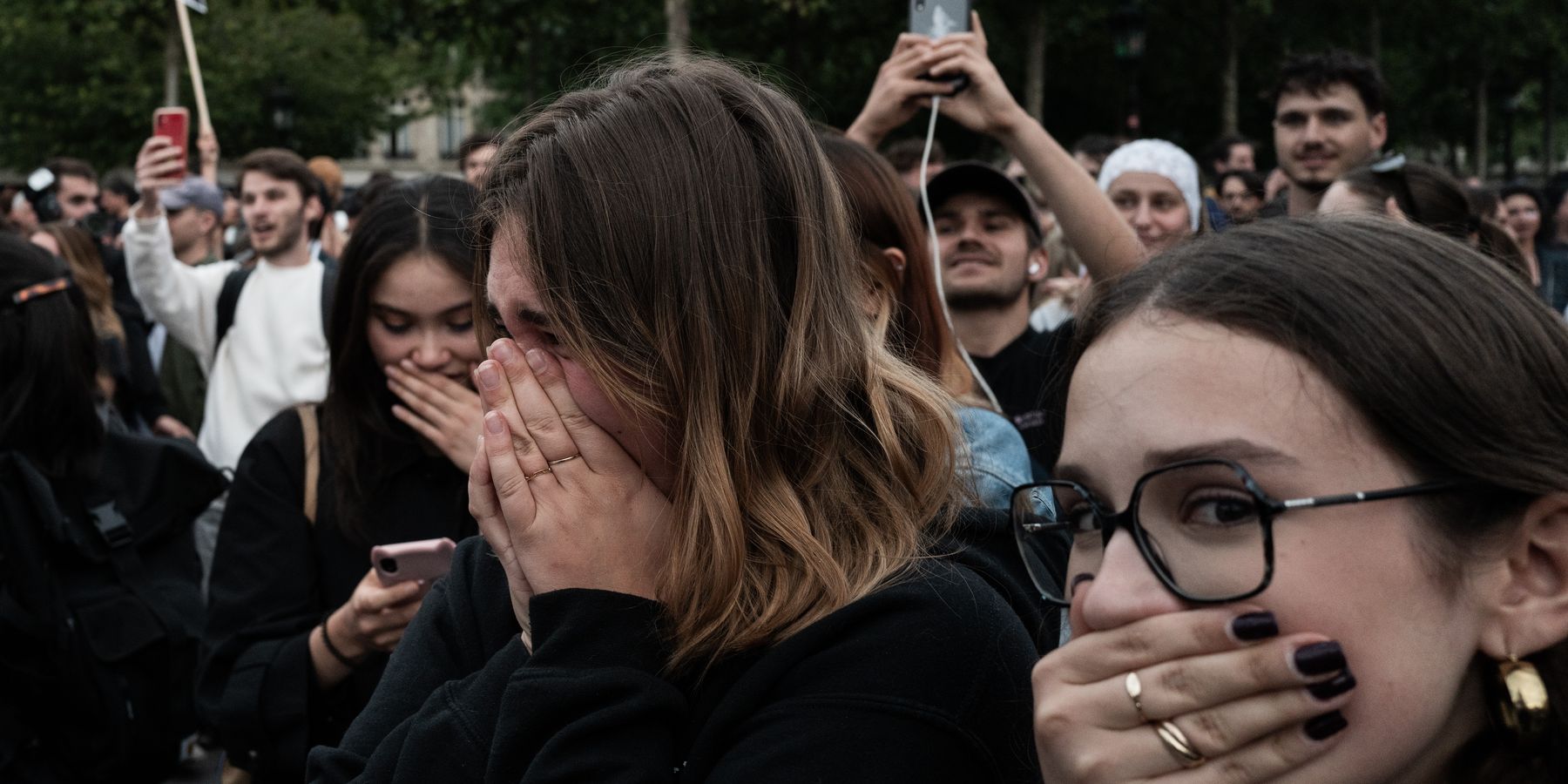The French electorate and most of the political parties have ensured that — at least until the next presidential elections, due in April 2027 — France will not have a government of the radical rightist Rassemblement Nationale (National Rally) of Marine Le Pen.
They have in the process opened the question of whether France can have a government at all. The prospect of the further decline of governance and political stability in one of America’s most important allies should be a matter of deep concern to the U.S. establishment; as also the possible implications for the future of the European Union and NATO.
The parties that reached a partial electoral pact to defeat the RN in the second round of the parliamentary elections on Sunday July 7 all agree on only one thing: keeping the RN out of power. They have spent most of the past decade ferociously attacking each other; and this is true not only of the leftist New Popular Front and the centrist liberal Ensemble Pour La Republique (“Together For The Republic”) but of the two main parties making up the New Popular Front.
It is necessary to point out (since most of the media reporting has completely obscured this) that while the anti-RN pact defeated the RN in terms of parliamentary seats, pushing it into third place, the RN and its allies came first in the popular vote by a very large margin, with 37 percent to the Popular Front’s 26 percent and Macron’s bloc’s 24 percent. When it comes to the presidential elections in 2027 therefore, the outcome is completely open.
The discrepancy between popular vote and parliamentary seats in this French election is a less extreme version of that produced by Britain’s “first past the post” system, that produced a parliamentary landslide (63 percent of seats) for Labour on the basis of a popular vote (33.7 percent) that barely increased from the last elections in 2019. The Conservatives, at 23.7 percent), were defeated mainly not by Labour but by the Rightist Reform Party, which took 14 percent of the vote, almost entirely from the Conservatives. In other words, much of the underlying trend in both the French and British populations remains towards more extreme Rightist positions.
In terms of French parliamentary seats, out of 577, the Popular Front won 182, Macron’s bloc 163, Le Pen and her allies 143, and the Republicans 68. This means not only that no bloc or party has a majority, but that the only possible coalition government that could command a majority is between the Popular Front and the Macron bloc.
If the Popular Front were entirely made up of the centrist socialists led by Raphael Glucksmann, this could work; but the largest party in the bloc is Jean-Luc Melenchon’s radical leftist La France Insoumise (“Unbowed” or “Rebellious” France). On many economic, social, and cultural issues, Melenchon can also rely on the support within the Front Populaire of the French Green party. Amongst other things, they categorically oppose measures to restrict immigration — the issue more than anything that has driven support for Le Pen.
Melenchon and the Greens are regarded by French centrists with a dread and aversion second only to their feelings about Le Pen; and in future it is not clear who the French establishment will fear most, if the center itself can no longer win.
Melenchon has been bitterly hostile not only to Macron’s entire agenda, but to much of Glucksmann’s as well. This extends to foreign and security. La France Insoumise and the RN, while differing on everything else, have both sought to follow de Gaulle by calling for French withdrawal from NATO’s unified military command. La France Insoumise has also advocated a compromise peace in Ukraine.
In this, it is much closer to Le Pen than to its own Socialist allies, who have been strongly supportive of Ukraine. RN has condemned the Russian invasion of Ukraine, but it has also opposed increased aid for Ukraine, and the desire of much of the party for peace in Ukraine is an open secret.
On the European Union, La France Insoumise, while not as viscerally hostile as RN, have been deeply hostile to the EU’s promotion of economic liberalization and open economic borders. The growth of these radical parties of the right and left is therefore extremely — perhaps fatally — bad news for the prospects both of increasing European integration and of further enlarging the EU. In particular Le Pen supporters with whom I have spoken are open about their deep opposition to Ukrainian EU membership, which they say would be disastrous for French agriculture.
La France Insoumise is also the only French party to have been strongly critical of Israel’s war in Gaza and to have advocated immediate recognition of a Palestinian state — for which it has been fiercely attacked by all the other parties including the Socialists. Pro-Palestinian demonstrations including La France Insoumise have been banned by the Macron government and in some cases broken up by the police.
As the leader of the single largest party in the largest parliamentary bloc, Melenchon has demanded the right to make the first attempt to form a government. This was however immediately rejected both by Macon’s bloc and by Melenchon’s own Socialist allies.
It seems therefore that in the short term (and as Macron has decreed), the present government of Macron’s appointed prime minister, Gabriel Attal, will continue in office on a caretaker basis while attempts are made to stitch together a workable coalition. And if other European countries are anything to go by, the short term could be pretty long. In 2023-24, it took 223 days for the Netherlands to get a new coalition government; in 2021, nine months.
The reason was the same as in France: the fragmentation of the parliamentary scene, and the refusal of other parties to allow the radical right to lead the government. The Dutch managed to trundle on reasonably well under caretakers; but France is a great deal more influential than Holland, and the French population a great deal more volatile.
As to French foreign and security policy, the parliamentary vote is technically irrelevant, since under the constitution of the French Fifth Republic created by de Gaulle, this area of policy remains the prerogative of the president, whatever the majority of parliament and the political identity of the prime minister and cabinet. And as long as President Macron is not called upon to make any really serious decisions, this may hold until 2027, just as domestic “cohabitation” between the president and a fundamentally hostile (though from different directions) parliamentary majority may also work okay, as long as no domestic crisis occurs to demand action.
“For the next three years, the French state will do fine, as long as it doesn’t have to do anything,” in the view of one French friend.
It would however be a very bold and optimistic analyst who would predict that France, and Europe as a whole, will be able to get through the next three years without facing a major crisis. In particular, of course, there is the war in Ukraine, and the possibility of some combination of U.S. insistence on compromise and U.S. withdrawal of support should Trump be elected in November.
To my surprise, members of the Macron establishment in Paris told me — with at least the appearance of sincerity — that in this case France and the EU could successfully continue to support Ukraine without the United States, something that is regarded by mainstream German analysts as virtually delusional.
My French establishment interlocuteurs also told me that in the last resort, France should be prepared to live up to Macron’s suggestion of sending French troops to Ukraine. This would seem not so much delusional as insane, since it is opposed by three quarters of the French electorate, much of the armed forces, La France Insoumise on the Left and Rassemblement Nationale on the Right. Indeed, the RN has declared that when it comes to sending French troops into a war, the president’s constitutional authority over security policy does not apply.
If he did take such a step, Macron would be risking not merely expanded war in Ukraine, but revolutionary political crisis at home. Then again, if there is one thing we have learned about Macron these last seven years, it is that he is a risk-taker to the core.
- Marcron v. Le Pen: What the French election means for the US ›
- European elections: Was the Ukraine War another big loser? ›
















